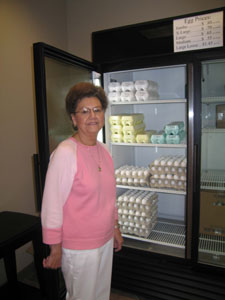By Margie Wuebker
mwuebker@dailystandard.com PHILOTHEA -- Hemmelgarn & Sons has risen from the ashes of a disastrous fire in 2003 and this weekend will celebrate 75 years of supplying eggs to people around the world.

An open house from 12:30 to 3 p.m. Sunday will give area residents a behind-the-scenes look at sections of the egg packaging plant added in the wake of the November 2003 fire.
"We were totally overwhelmed by the help we received from the community," says company President Ron Gross. "The open house is our thank you to neighbors, customers, vendors, producers and the general public for their continued support."
The business, located at 3763 Philothea Road, ships more than 1.4 million cases of eggs each year to grocers, retailers and customers in the food service industry, according to a press release issued by the company. The majority are located in an 800-mile radius of downtown Philothea. However, there are also global accounts in Japan, where consumers prefer smaller grades of eggs, and Puerto Rico.
Always a good neighbor, Hemmelgarn & Sons keeps a well-stocked cooler in the front lobby for area residents in need of eggs for such things as country breakfasts, homemade noodles and light-as-a-feather angel food cakes. Ed Hemmelgarn started the egg-processing venture in 1930 with $35 in his pocket and a trusty Model T Ford, the company's release says. He purchased eggs from Philothea neighbor August Dues and shipped them at the rate of 20 to 30 cases per week.
Hemmelgarn hauled farm-fresh eggs to the St. Marys train depot in the back of the Model T and loaded the crates on eastbound trains headed to New York. By 1934, he was involved in the egg and poultry business full time and shipping 150 to 200 cases per week. Two years later he established a grading and candling operation in a former dance hall located across the road from the current site.
The business continued to grow and by 1950 had four grading machines and weekly egg shipments totaled nearly 1,000 cases. It was truly a family operation as Hemmelgarn's wife, the former Josephine Wenning, helped with the workload and so did their children, Floyd, Jerry and Betty (Jutte).
Fire destroyed the old dance hall in 1950, and carpenters built a new processing plant at the present site. Family members recall hosting a dance to thank the community for its assistance in fighting the blaze and support during the aftermath.
The company incorporated as Hemmelgarn & Sons in 1959. Floyd Hemmelgarn assumed leadership from his father at a time when shipments totaled 1,500 cases. By the time he retired in 1990, the numbers had climbed to 18,000 cases.
He took the operation to a new level, acquiring flocks of laying hens and hiring farmers within a 30-mile radius as caretakers, according to Gross. The company currently has 1.6 million hens housed at 19 area farms. Three additional farms raise pullets that will join the laying flock at the age of 20 weeks
Inside the packaging plant, the assembly line equipment washes, sorts and packages eggs at the rate of 225,000 per hour. Human hands do not touch an egg from start to finish. Rejected eggs are sold to Schmitt's Fur Farm in nearby Fort Recovery.
Employee Louie Braun of St. Henry, who marked his 49th anniversary as a truck driver with the company earlier this month, has loaded mountains of eggs over the years. He recalls stowing wooden cases into a 1953 Chevrolet truck -- a far cry from today's fleet of refrigerated semitrailers now decorated with bold yellow and black lettering proclaiming Hemmelgarn Superior Quality Eggs.
"We didn't use skids in the early days so everything had to be handled twice," Braun says. "We handled everything twice and applied labels by hand."
Braun marvels at the mechanization that has taken place throughout the plant including the shipping and receiving department where he spends most of his time. He also welcomes the advent of power steering each time he crawls into a delivery truck bound for Pittsburgh, Akron, Cleveland and Youngstown.
The 90 employees at the plant have helped the business prosper during market fluctuations, technological changes and two disastrous fires, company officials say.
The $1.5 million dollar blaze in 2003 resulted in an outpouring of support and help from area residents, employees and friends to get the undamaged portion of the plant in order to pass required inspection.
"The fire struck on a Wednesday morning and we were back processing eggs at 6:30 a.m. Saturday," Gross says. "It represented an incredible effort. Our USDA inspector was so impressed she asked for the honor of turning on the machines."
The plant, which once measured 70 by 240 feet as a result of additions over the years, now encompasses 120 by 240 feet. The latest construction, completed in October, adjoins areas that escaped the brunt of the fire.
The company operates eight-hour shifts Mondays through Fridays and increases daily scheduling by one hour with the approach of Thanksgiving and Christmas -- undeniably the busiest time of the year.
"Our goal has always been and will continue to be supplying customers with fresh eggs," Gross says. "And it all happens right here in Philothea." |

